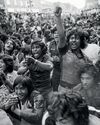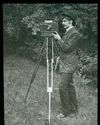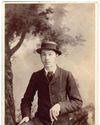
‘Today I think the split between black and white in South Africa is irreconcilable. The whites are certain that it is our heart’s desire to be integrated into their society as social and economic equals, but they are wrong. The cruelty of apartheid – separateness – has infected us as well as them: We believe as fervently as they that there should be as little contact between the races as may be possible. For only by a separation more absolute than the most ardent racist could wish does there seem to be a chance of freedom from the suffering and oppression that living beside white men inflicts upon us.’
These were Ernest Cole’s opening lines for his book House Of Bondage when it was first published in 1967. They couldn’t be more devastating or less full of hope, and reflect the depth of his despair at the system that was crushing non-white people in his country – a culture that was ingrained in each new generation of whites and which dehumanised each new generation of blacks. Through his pictures, Cole showed, and shows, the world just how horrific and degrading the situation was in South Africa in the early and mid-1960s – and not the slightest power has left them. When one looks at his pictures and reads his written accounts of his experiences, it’s almost impossible not to fully sympathise with the sentiments expressed in those opening lines. It’s only with our retrospective viewpoint and the knowledge that the apartheid era did eventually come to an end that we can see hope did have a place, though tragically not within Cole’s own lifetime.
Denne historien er fra December 13, 2022-utgaven av Amateur Photographer.
Start din 7-dagers gratis prøveperiode på Magzter GOLD for å få tilgang til tusenvis av utvalgte premiumhistorier og 9000+ magasiner og aviser.
Allerede abonnent ? Logg på
Denne historien er fra December 13, 2022-utgaven av Amateur Photographer.
Start din 7-dagers gratis prøveperiode på Magzter GOLD for å få tilgang til tusenvis av utvalgte premiumhistorier og 9000+ magasiner og aviser.
Allerede abonnent? Logg på

Calling The Shots: A Queer History of Photography
Offering an unprecedented view of photographic history through a queer lens, this is a wonderful and powerful book, says

Large-aperture standard zoom, too
SONY has also revealed a new premium standard zoom, the FE 28-70mm F2 GM.

Super-fast, high-res Sony Alpha Ai II
SONY has announced its new professional full-frame flagship camera, the Alpha A1 II.

39 awesome accessories
Our round-up of the best accessories we've used and reviewed this year, along with some old favourites. There's something here for every budget, starting from just £7, including tripods, bags, filters and much more

Such a thing as society
This autumn sees the launch of a major new book and exhibition devoted to examining the multiplicities of photography during 1980s Britain. Peter Dench finds out more

Join Club
The sociable Canvey Island Photographic Club is keen to grow its in-person meet ups

Capturing flight
Winners and finalists of Bird Photographer of the Year share their tips for success with Hollie Latham Hucker

140 years of change
AP has become the world’s oldest surviving consumer photo magazine because we have moved with the times, says Nigel Atherton

Preserving history in platinum
A deep dive into the meticulous art of platinum printing, and the collaboration between the Royal Geographical Society and Salto Ulbeek. Mike Crawford explores how they brought historical photographs to life with enduring beauty and precision

Life in the past lane
What was life like for an amateur photographer in 1884? John Wade takes a trip back in time